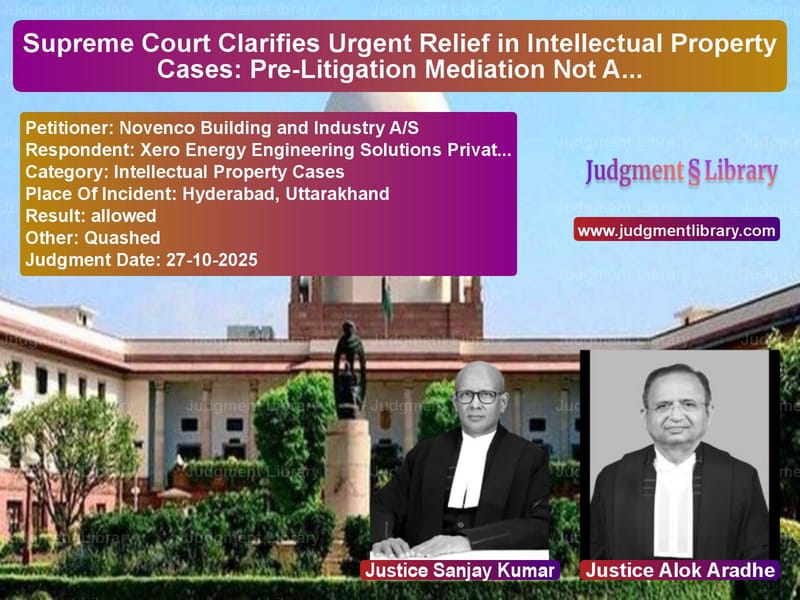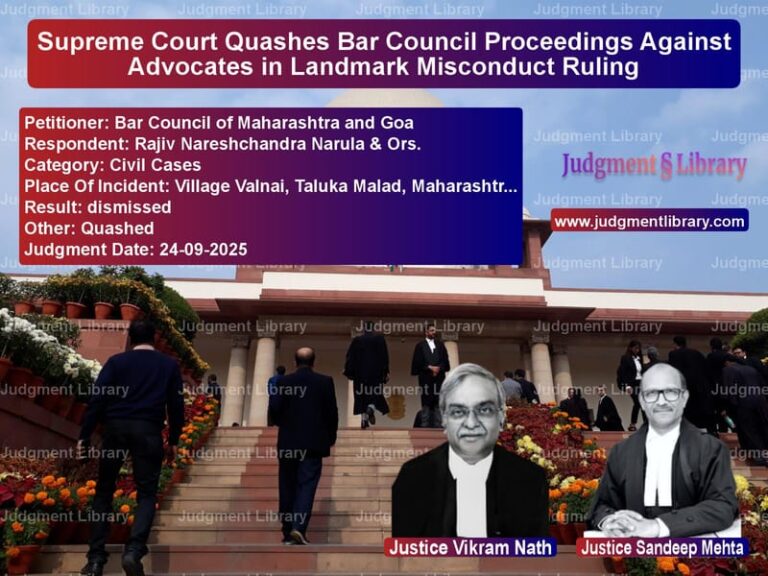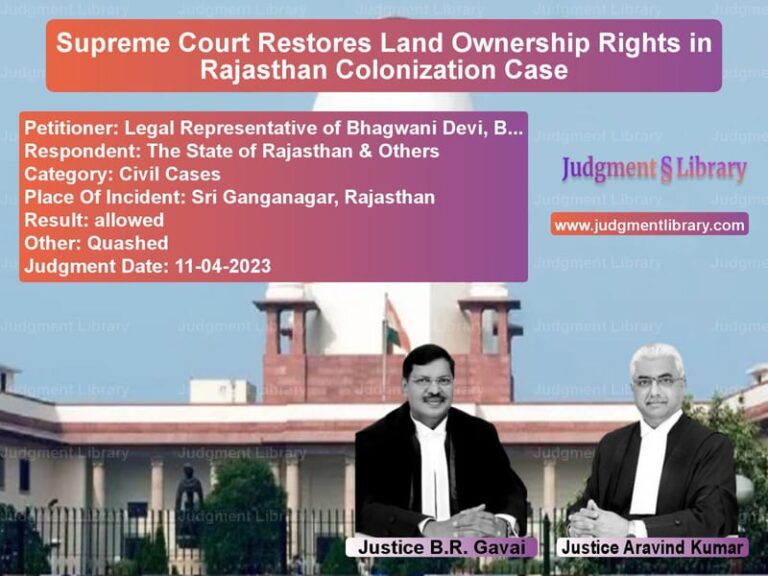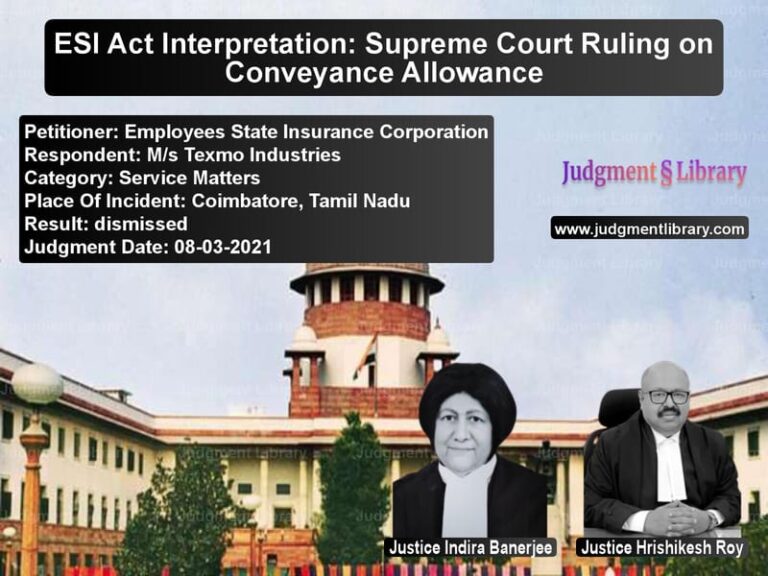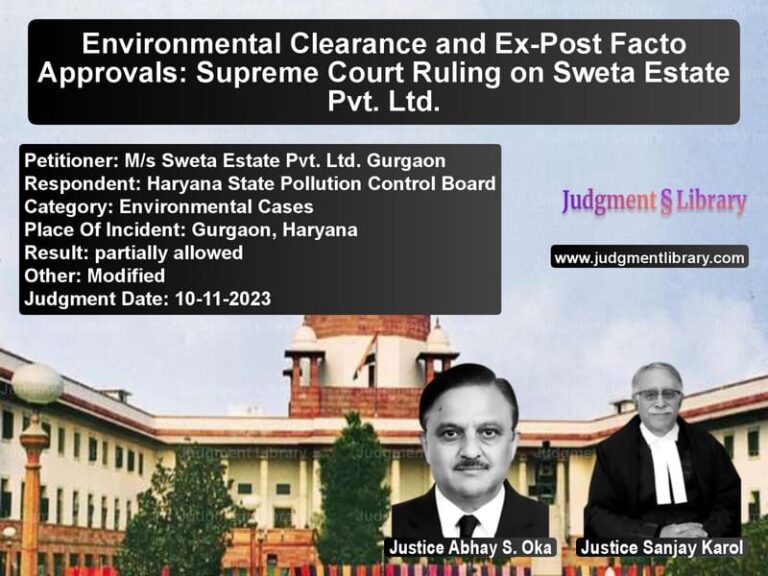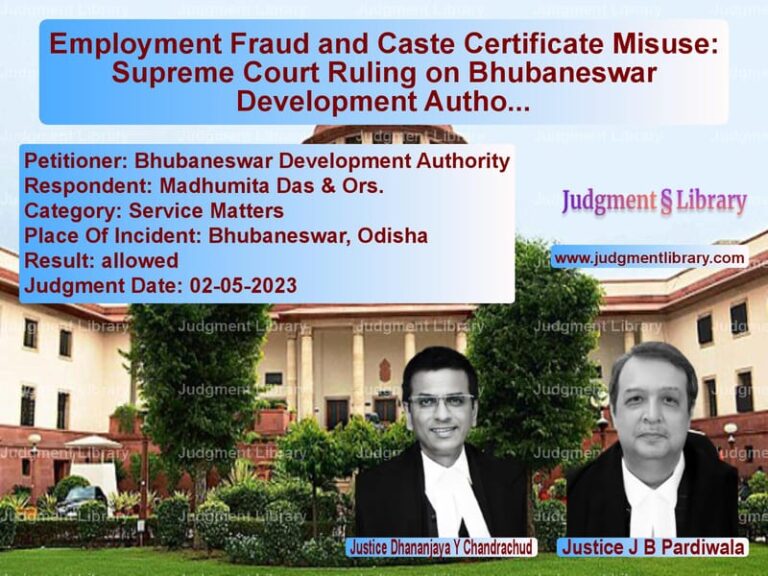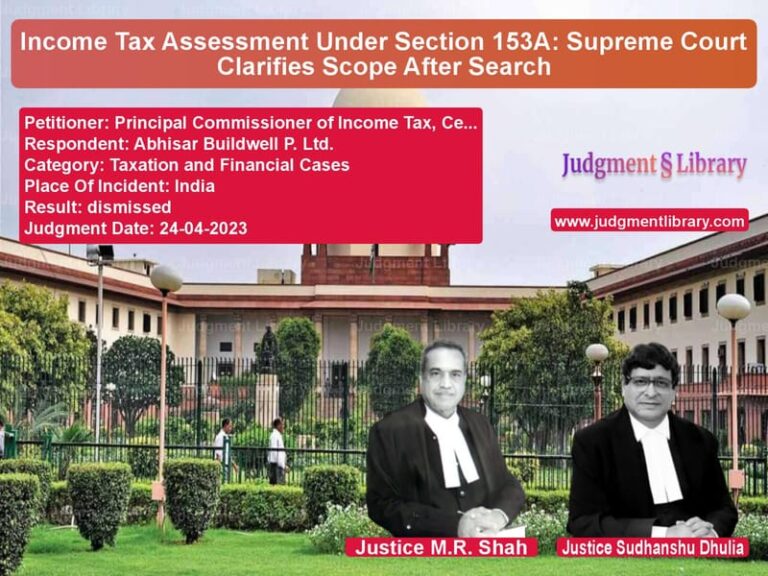Supreme Court Clarifies Urgent Relief in Intellectual Property Cases: Pre-Litigation Mediation Not Always Mandatory
In a landmark judgment that clarifies the interplay between intellectual property protection and mandatory pre-litigation mediation, the Supreme Court has delivered a significant ruling that balances procedural requirements with substantive rights. The case involved a Danish company’s fight against alleged patent and design infringement by its former Indian distributor, raising fundamental questions about when courts can exempt parties from mandatory mediation requirements in commercial disputes.
The legal battle began when Novenco Building and Industry A/S, a Danish company engaged in manufacturing highly efficient industrial fans marketed under the brand ‘Novenco ZerAx’, discovered that its former distributor had allegedly started manufacturing and selling identical fans under a deceptively similar name and appearance. The appellant company had invested approximately 3.66 million euros between 2007 and 2015 to develop its brand and had secured several patents and design registrations to protect its innovation in India and abroad.
The Factual Background
The dispute originated from a dealership agreement executed on September 1, 2017 between Novenco and Xero Energy Engineering Solutions Pvt. Ltd. for marketing and sale of Novenco ZerAx fans across India. According to Novenco, Xero Energy’s director violated the distribution agreement by incorporating another company, Aeronaut Fans Industry Pvt. Ltd., for manufacturing and selling identical fans.
The appellant discovered in July 2022 that Xero Energy had started marketing competing products. After sending multiple communications seeking clarification and receiving no satisfactory explanation, Novenco terminated the dealership on October 14, 2022. The company then sent a cease-and-desist notice to Aeronaut Fans in December 2022.
The technical expert of Novenco inspected the fans installed by Aeronaut Fans at Cavendish Industries and Hero Moto Corp, Uttarakhand, on December 6, 2023 and submitted his affidavit confirming the infringement on February 6, 2024. The appellant obtained patent and design certificates in March-May 2024 and filed a commercial suit on June 4, 2024 alleging infringement of its patent and design rights.
The Legal Battle in Lower Courts
The crucial legal issue emerged when Novenco filed its commercial suit along with an application for interim injunction and an application seeking exemption from pre-institution mediation as mandated under Section 12A of the Commercial Courts Act, 2015. The respondents filed applications for return and rejection of the plaint, arguing that no genuine urgency existed and non-compliance with Section 12A was fatal to the suit.
The learned Single Judge of the High Court passed two separate orders on August 28, 2024. While rejecting the plea for return of plaint in one order, the judge in the second order held that there was a delay of six months between the inspection of fans and filing of the suit, and the plea of urgency was not substantiated. The court emphasized that “pre-institution mediation under Section 12A of the Act is mandatory, unless urgent interim relief is sought bonafide” and concluded that “in the absence of genuine urgency, the plaint was liable to be rejected under Order VII Rule 11 of CPC.”
The Division Bench of the High Court, in its order dated November 13, 2024, agreed with the Single Judge’s reasoning. The Division Bench held that “delay between inspection of fans and filing of the commercial suit exhibits patent lack of urgency” and that “exemption from requirement of compliance of the mandate contained in Section 12A of the Act cannot be claimed merely because interim reliefs were sought.” The court further observed that “mere continuous infringement of intellectual property rights could not override the statutory mediation requirements.”
Arguments Before the Supreme Court
Before the Supreme Court, the learned senior counsel for the appellant submitted that the High Courts had erred in not applying the correct test for determining whether the appellant was entitled to interim injunction based on urgency. He argued that “the urgent interim relief was not sought to bypass the statutory mandate of pre-litigation mediation” and emphasized that “the plaint along with the documents have to be read together to find out whether any urgent interim relief is correctly sought.”
The appellant’s counsel contended that “mere delay in filing the suit for infringement and injunction against continuing violation of intellectual property rights by itself is not a ground to decline the injunction against an infringer.” Reliance was placed on decisions of the Supreme Court in Midas Hygiene Industries Private Ltd. & Am. v. Sudhir Bhatia & Ors. and Yamini Manohar v. T.K.D. Keerthi.
On the other hand, the learned senior Counsel for the respondents argued that the High Courts had correctly found that the plaint did not make out any need for urgent relief. He pointed out that “in the plaint there is not a single word on the urgency” and highlighted that “the appellant had issued a cease-and-desist notice on 23.12.2022 and thereafter had filed the suit after a delay of one and half years, in June, 2024.”
The respondents’ counsel further submitted that “the suit was filed after four months of the submission of expert opinion” and therefore, “there was no urgency to deviate from the mandatory statutory requirement under Section 12A of the Act.” He urged that “mere filing of an application for interim relief does not ipso-facto indicate urgency” and there was no material to suggest ongoing patent violation.
The Supreme Court’s Analysis
The Supreme Court began its analysis by examining the statutory provision of Section 12A of the Commercial Courts Act, which mandates pre-institution mediation for commercial suits unless the suit “contemplates any urgent interim relief.” The court noted that the provision was incorporated with the object “to provide for compulsory mediation before initiation of a suit where no urgent interim relief is contemplated.”
The court distilled the legal principles from its previous decisions, including Patil Automation Pvt. Ltd. v. Rakheja Engineers Pvt. Ltd., Yamini Manohar v. T.K.D. Keerthi, and Dhanbad Fuels (P) Ltd. v. UOI. The key principles established were that Section 12A mandatorily requires pre-institution mediation, but a plaintiff can be exempted when the plaint and documents clearly show real need for urgent interim intervention. The court must look at the plaint, pleadings and supporting documents to decide whether urgent interim relief is genuinely contemplated, considering factors like immediacy of peril, irreparable harm, risk of losing rights, and whether delay would render relief ineffective.
The Supreme Court made a crucial distinction in intellectual property cases, observing that “the subject matter of the present action is continuing infringement of intellectual property. Each act of manufacture, sale, or offer for sale of the infringing product constitutes a fresh wrong and recurring cause of action.”
In a significant clarification, the court stated that “it is well settled in law that mere delay in bringing an action does not legalise an infringement and the same cannot defeat the right of the proprietor to seek injunctive relief against the dishonest user.”
The court emphasized that “from the standpoint of the appellant, each day of continuing infringement aggravates injury to its intellectual property and erodes its market standing. The urgency, therefore, is inherent in the nature of the wrong and does not lie in the age of the cause but in the persistence of the peril.”
The judgment also highlighted the public interest dimension, noting that “when imitation masquerades as innovation, it sows confusion among consumers, taints the market place and diminishes faith in the sanctity of the trade. The public interest, therefore, becomes the moral axis upon which the urgency turns.”
The Court’s Final Ruling
The Supreme Court found that the High Court had erred in construing the test for urgent relief under Section 12A. The court held that “the learned Single Judge as well as the Division Bench of the High Court erred in construing the test for urgent relief enumerated in Section 12A of the Act, in as much as the courts have proceeded to examine the entitlement of the appellant to urgent relief based on the merits of the case rather than looking at the urgency as is evident from the plaint and the documents annexed thereto from the standpoint of the plaintiff.”
The court specifically rejected the High Court’s approach that lapse of time between discovery of infringement and filing of suit negated urgency, stating that “such an approach, in our considered view, is contrary to the principles laid down by the decisions of this Court.”
In its conclusive findings, the Supreme Court held that “In actions alleging continuing infringement of intellectual property rights, urgency must be assessed in the context of the ongoing injury and the public interest in preventing deception” and that “Mere delay in institution of a suit by itself, does not negate urgency when the infringement is continuing.”
The court allowed the appeal, quashed and set aside the judgments of the High Court, and restored the commercial suit to be proceeded with on merits in accordance with law. This judgment provides crucial clarity on when intellectual property rights cases can bypass mandatory mediation requirements, ensuring that procedural formalities do not undermine substantive rights protection in cases of ongoing infringement.
Petitioner Name: Novenco Building and Industry A/S.Respondent Name: Xero Energy Engineering Solutions Private Ltd. & Anr..Judgment By: Justice Sanjay Kumar, Justice Alok Aradhe.Place Of Incident: Hyderabad, Uttarakhand.Judgment Date: 27-10-2025.Result: allowed.
Don’t miss out on the full details! Download the complete judgment in PDF format below and gain valuable insights instantly!
Download Judgment: novenco-building-and-vs-xero-energy-engineer-supreme-court-of-india-judgment-dated-27-10-2025.pdf
Directly Download Judgment: Directly download this Judgment
See all petitions in Judgment by Sanjay Kumar
See all petitions in Judgment by Alok Aradhe
See all petitions in allowed
See all petitions in Quashed
See all petitions in supreme court of India judgments October 2025
See all petitions in 2025 judgments
See all posts in Intellectual Property Cases Category
See all allowed petitions in Intellectual Property Cases Category
See all Dismissed petitions in Intellectual Property Cases Category
See all partially allowed petitions in Intellectual Property Cases Category

